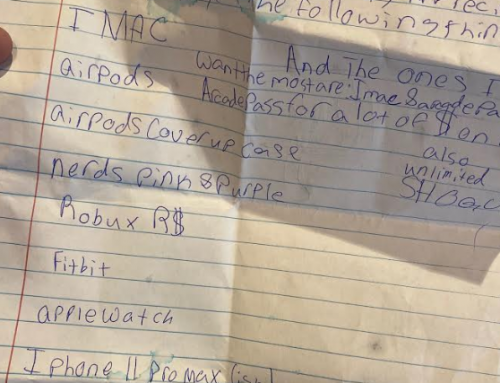The ball soaring thru the air, he quickly glances up, blinded by the sun. He wipes a bead of glistening sweat from his brow and receives the ball with his chest. It falls right to his feet, in perfect stride. He begins to dribble, managing to maneuver around a sturdy defender. Then he jukes left, and looks right, he cuts inside the center back. The keeper is the only thing standing between him and victory. As the keeper makes a diving save, landing on the ground, knowing he is defeated, the ball sails past him to find the back of the net. What a GOAL!!
It is exciting to celebrate a victory with my favorite soccer player, but I can’t help but think about the kids on the other team and the disappointment they must feel. Everyone wants to be on the winning team, but what about the moments in life when we are on the loosing team? How does that make us feel? What will the post-game speech sound like, or the car ride home? Will this be the game that breaks us? What about the player that never made it off the bench or the player that can’t make the grades? We all have been there, and can fondly recall the elated feeling of victory, and how devastating it can feel to suffer defeat. The manner in which we handle life’s victories and defeat is how our character is defined.
As parents, are we adding excessive demands and pressures to our kids by expecting more than they are capable of? The balancing act of school, sports, college, relationships, jobs, driving, social issues and just being a kid is cumbersome and especially challenging for our student athletes. Increased expectations are pushing our kids to higher levels of anxiety than ever seen before, and this culture is creating its own epidemic of childhood anxiety! This shift in societal expectations is causing mental overload and stress to our overwhelmed and anxious students.
Recipe for Disaster
It is important to focus on the student athlete, as many suffer from extreme levels of pressure, not only from school expectations, but also their chosen sport. The mental health of our youth is a worldwide issue, and suicide is the 3rd leading cause of death among student athletes in the United States. (BOC, Suicide Prevention Part 2: Athlete Suicide Risks, 11/18)
Students are burdened with the intrinsic stress they place on themselves, as well as the expectations piled on from outside sources. Inside their developing bodies lives a vibrant thirst for the games they love. What young boy hasn’t dreamed of being a professional athlete? Often these young athletes don’t even consider a plan B as their hearts are truly set on the pie in the sky dream of greatness! They want to be the best player on the team, score the most points, and be the MVP! There is often a coach with surreal expectations and many parents pushing their kids, living vicariously through their experiences. Top that off with an impossible school work load and the already awkward and tricky life of a pubescent teen. This is a recipe for a severe case of childhood anxiety! It can wreak havoc on your child’s health. Not only is this insurmountable pressure on your child’s shoulders, but they lack the mental development to cope with this overwhelming amount of stress. Our students are facing personal defeat, before they even step on the field. How can you help your student overcome this anxiety?
STUDENT ATHLETE
It is exciting and stressful to be a student athlete. Most student athletes are smart, outgoing and popular and shoulder a lot of responsibility. As a student first, these developing teens must demonstrate the ability to balance work load and time management, while making the grades. Second, as an athlete, they represent their school, or club, which affects their social reputation. They take this athletic responsibility very seriously, and are often expected to perform at unrealistically high levels. Student athletes are consumed with juggling the endless list of demands on and off the field.
When we are young our bodies are strong and have a great desire to be in motion. Parents are pushing their children to get involved, to stay active from an early age. Our kids are enrolled in youth sports at a record pace, even before they enter their first day of school. There are countless valuable lessons our kids can learn by playing organized sports. Sports are about more than individual performance, it is about character, being a team player, and being coach-able. There are physical and mental health benefits when our kids are involved in organized sports, but let’s keep all things in perspective! STUDENT comes first in student athlete. It is important that we teach our kids to balance their educational requirements, with their athletic desires. As parents, it is easy to get caught up in the ambiance of the game. But we must encourage them to value and prioritize all the demands placed on them, while keeping in mind that they are still developing children.
All successful athletes know the mental game is just as important as the physical game. The players must have confidence, desire, initiative, courage and respect to be an asset to the team. Sometimes players are too focused on comparing themselves to others, with game time performance, grades, class rigor, and all the social implications that go along with the dangerous game of comparison. They impose unrealistic pressures on themselves which can be exacerbated by expectations from coaches, parents and peers. Many kids are confused by the often unfair politics that take place in youth sports. They place a lot of their value and self-worth on how much playing time they get, how they are treated by their team mates and how valuable they feel to the team. When your child is struggling with their mental game, help them regain confidence by helping them focus on the things they are good at. Providing them ways to regroup and find mental calm and balance. Slow deep breathes are the easiest and most effective way to quickly slow your heart rate, and reduce stress.
There is a ridiculous stigma that student athletes should be strong and tough. They are constantly working to avoid disappointing parents, coaches and teammates. It is a desperate place for our kids to reside. All this combined pressure contributes to the growing concerns that we are losing our kids and depriving them of their innocence.
Are we decimating their fleeting years of childhood with unrealistic expectations?
Juggling academic success, along with physical development, and a changing body both mentally and physically can take a toll on a young mind. These developing, malleable minds need a strong advocate to keep them on track and to help them navigate through the nagging pressures of growing up and avoiding the pitfalls of childhood anxiety.
Parent Coach
The coach controls the game and makes the play. As parents, it’s our job to step in to be their advocate, helping them navigate this treacherous journey. We are the play-maker, the guiding force behind what we expose our kids to. It is our job to set the limits and expectations; to guide our kids to find a healthy balance in life.
We have to first know our kids, their capabilities and thresholds, keeping in mind their physical, mental, developmental and social well-being. This will look different for every child, and every family, dependent on a multitude of factors. We have the ability to limit the number of sports they are able to participate in, help them choose which classes they should take in school, when they should do their homework, which friends they get to spend social time with, etc. Let’s call this the game plan!
The Game Plan
It is essential that we communicate with our children and allow them to be a driving force in their game plan. I see so many parents pushing their kids, both academically and athletically, along a path of their personal choosing, not their child’s preferred path. As their parent, and current life coach, it is your job to help your student athlete set realistic expectations that encompass who they are. Focus on setting goals in many different areas of their lives, school, sports, social, work and chores. Don’t forget it is our job to also teach them fundamental life skills. As parents we have 18 years to get it all in, and often times we neglect the simple mundane things, while pushing for the more exciting aspects of life. How will you help guide your student athlete, when they are staring at the reality of stress and anxiety?
How to create a game plan:
- Bite Size Goals: These are small daily, weekly or monthly goals that can be easily achieved. By achieving these small goals, it will build confidence; promote progress and a strong sense of self-worth.
- Small Slice Goals: These are larger and a more long term goals. Things that can be accomplished in a year or a sporting season. Small slice goals are a little tougher to reach, but are attainable with hard work and effort. It gives your student athlete a sense of accomplishment, and the appreciation that hard work pays off.
- Whole Wedge Goals: These are larger, 2-3 year, goals that can really make the plan take shape. It is often their course of action for high school or college. Whole wedge goals are more uncomfortable and are going to take a lot of hard work, and diligence. Often these goals change as your child develops and matures.
- Pie in the Sky Goals: These are long term, dream goals. Often they are unrealistic and may be near impossible to achieve, but everyone needs to have a dream! All the other goals should support this pie in the sky dream! Don’t focus on this goal, start at the bottom!
Once you have a game plan, have check-ups at least once a month to show them how they are accomplishing their goals and make changes as needed. This ongoing conversation is creating a relationship built on respect and support for your child. Let them know it is OK for this to be a constantly fluid and changing plan, or working draft. Aren’t we all a work in progress?
Setting goals and encouraging them, at their pace, will allow your student athlete to be well rounded, create balance and prevent them from getting burned out or wanting to quit. Change the plan when it isn’t working, reduce the stress by changing clubs, or teams, and recognize when there is significant coach/player conflict. Allow your student to take regular classes, rather than an advanced course load, when they are struggling to be successful. Make sure your child knows that they do not have to be the best player on the team or the smartest kid in class for to you to be proud of them. Be honest with your child, sharing your experiences, and letting them know about your struggles. By exploring realistic expectations, and paring your child’s goals and abilities with their game plan, you are setting them up for success and a fulfilling childhood. Excessive burden and anxiety can push student athletes into a desperate mental state, and has been linked to childhood depression.
My son has had his pie in the sky dream to play soccer in college. We are still in the process of figuring it all out, but when we talk about it, and have our game plan check-ups, I continually share with him that it’s OK to change his mind. I remind him that he doesn’t have to have it all figured out. I don’t expect him to know what he wants to be when he grows up, where he will go to college, or where he will live.
Constantly I am instilling the ideology of self-discovery, to help him carve out his desired path. He is encouraged to take classes that interest him, play on teams that are fun, and spend time with people that make him laugh. I tell him that the plan is in pencil and can be altered or changed, as he figures it out. By teaching him that his value isn’t based on what team he makes, how much he plays, or if he makes the best grades in the hardest classes, I am giving him back a little piece of his childhood. Releasing him from many of the unrealistic pressures that plague our student athletes.
Parents it is OK to abandon the philosophy that our students need to be in the most rigid classes, to ensure they are accepted into the best colleges. Be honest, most of us were not the exemplary student we expect our kids to be. Secretly, I know this freedom from excessive pressure is actually allowing him to inch closer and closer to his goals, without pushing them on him.
The Referee
Parents, we now have to take the game plan and make it fit into an actual lifestyle!
How to be a responsible parent referee:
- Don’t over schedule your kids! They have school, sports, family life, church, social life, and don’t forget time to enjoy being a KID! Set limits that encourage balance.
- Sleep! Kids need extremely large amounts of sleep, especially the student athlete. Sleep is vital for your child’s development, both mentally and physically. Adolescent and teen athletes need on average of 9-11 hours of efficient sleep nightly. When your child indulges in a consistent nightly slumber they have increased performance, heightened mood and mental focus, energy and reduced injury risk.
- No pass, No play! It is vital that kids realize the ticket to success is found in the classroom. Every college coach will tell their prospective athletes that school comes first. They can’t use an athlete that can’t make the grades. These additional pressures can cause heightened levels of stress and anxiety. I have pretty smart kids, but I also know they love the games they play, so I help them find a healthy balance and set them up with a game plan that will allow them to do THEIR BEST! They do not need to be the best; they only need to do THEIR BEST! Help your child be successful by selecting class schedules that will allow them to be successful and learn at their personal pace, rather than competing with their peers. Guide them to teams, and sports that fit their goals and competitive style. This helps reduce stress and burn out on the field and in the classroom.
- Let them be KIDS! Make sure to encourage your child to have fun, go outside, and play with friends. It is easy to get wrapped up in the GPA game, or who is getting the most playing time. It often pushes an excessive amount of anxiety onto our students when they are constantly striving to be the best at everything. They have their entire lives to push, work, worry, and stress over their future. Don’t let them forget they are still kids. Sometimes it takes an intentional effort to give them a break from the pressures of everyday life.
The Cheerleader
Behind every tired child, is a tired parent, and your job is never done!
Once the plan is in place, and all scheduled out, it is now your turn to be the cheerleader.
Speak life into your kids! Set them up for success and encourage them. As parents, it is our job to give them encouragement, and confidence. It is also vital that they know we love them even when they fail. Our kids want to know we love them no matter what.
Don’t think the car ride home speech is just for after the game! All of those tough moments, when your child comes to you to talk about a grade, a class, a relationship, or a game, are important and we need to speak love and life. It’s true; the conversations we have with our kids can have lasting effects and can affect the amount of stress and worry our kids are facing. Kids are constantly worried they will be harshly judged, get into trouble, or be a disappointment. Give them the confidence and tools to come to you for a safe place of refuge. They just want you to love them, in a nonjudgmental, unconditional, I am your parent, and I love you win or lose, A’s or C’s. I am here to help you!
Things that speak life into your child:
- I had fun watching you today.
- Did you have fun?
- I’m so proud of you.
- You worked so hard.
- Did you do your best?
- I’m so lucky I get to be your mom (dad).
- Did anything funny happen today?
In the moment that your child comes to confide in you and share their victories and defeats, be there to love them, no matter the outcome. These are the relationship, confidence building, cheers that will calm your student athlete and give them the courage to keep going. You will be their hero for allowing them to grow and learn. Encourage them to always do their best and be proud of their best effort.
Speaking life into our kids builds self-worth, and confidence. It provides a foundation for them to be able to accept failure without it defining them. This is valuable in all areas of life, on and off the field. A well planned game strategy means they will keep trying because they know their performance is not tied to your relationship with them.
Show up- for your kids! Be present for your kids in their activities. When we take an active role in our kid’s activities, we show them we love them and care for them. It builds their character and validates their place in the world. This vitally important action shows them that love is unconditional and you want to share in their successes and their failures. Being present and showing up for your kids has far greater impacts than any material thing you can provide them. I want my kids to know I want to be there every chance I get. Parents breathe in these moments… one day we will miss these busy days.
As parents we strive for our kids to be the best they can be, but let’s remember, without a healthy mental game nothing else matters. Your child’s well being, health and safety are more important than any grade or any team. Help your student athlete BE THE BEST THEY CAN BE! Instilling the confidence needed to go into this world able to tackle good days and bad day. These character building moments will help them overcome anxious and stressful situations and provide them the skills to combat childhood anxiety before it strikes them out!
How will you help your student athlete deal with defeat?
*This information is not intended nor implied to be a substitute for professional medical advice, it is provided for entertainment and educational purposes only. Depression is a disorder often linked with Anxiety Disorder. Please seek a licensed medical professional for proper diagnosis and treatment.

About the author: Tanya Goytia is a mother, wife, sister and friend. She is active in her children’s lives, a sports mom and a graduate of Texas A&M University. Her degree is in sociology and her masters work is in developmental psychology, holistic health and elementary education. She is a regularly contributing author to ADayinMotherhood.com.











Leave A Comment